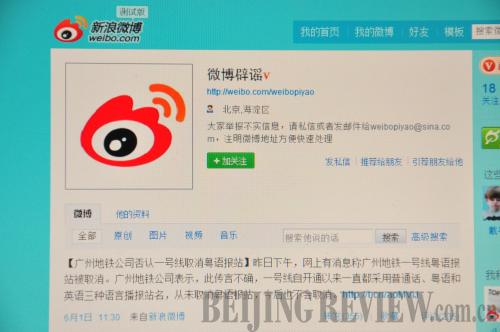|
 |
|
AUTHENTIC SOURCE: The Sina Weibo's investigative team has opened an account to refute misinformation (ZHANG YIZHI) |
The team uses a three-step process to track suspect postings. Team members look at how frequently a posting is reposted, then they contact the user who first posted the posting, and finally team members do a thorough fact-check to ascertain whether the posting is false.
"We don't refute a piece of misinformation until we are 100-percent sure it's wrong and have the evidence to support our judgment," Tan said. When they encounter controversial topics, the team is obliged to seek the advice of their editor in chief.
Misinformation publishers would be punished, Tan said. The team will delete false postings and even close down the accounts of users caught publishing misinformation.
On June 8, three postings on Sina Weibo said a student in Shaoyang County in central China's Hunan Province committed suicide on the first day of the national college entrance exam.
The postings said Lu Pin, an 18-year-old student in the No.1 High School in Longhui Township, had arrived 15 minutes late for the exam on June 7 and jumped to his death from the window of his sixth-floor dormitory after an exam supervisor prevented him from entering the venue.
After reading the postings and looking at other reports, Tan's team confirmed the news was a piece of false information. Team members discovered the local police received calls alerting them of a suicide at 8:57 a.m., three minutes before the exam began. It's clear late arrival could not have been the reason for the suicide.
As a punishment, the investigative team closed the three users' accounts for one month.
Sina Weibo's team's account now has more than 300,000 followers and the team encourages netizens to send in any questionable postings they encounter.
The diligence of the team's fact checking means it only refutes one or two postings every couple of days, Tan said. The Beijing Morning Post said the team had dispelled 129 pieces of misinformation since it was established.
"Misinformation is easily made, but disproving it can be tough," Tan said. "We have no idea where the next one will come from."
But Tan admits misinformation appears more often during disasters. For example, he said, after the devastating earthquake and tsunami in Japan in March, many postings asserted, wrongly, China was in imminent danger from radiation release from damaged Japanese power plants, which helped fuel the panic buying of iodized salt. At that time, Tan's team had to call 10 other Sina.com staff to help deal with misinformation.
Besides Sina Weibo, other major micro-blogging service providers in China, such as Sohu.com, QQ.com and 163.com, have also established investigative teams and opened official accounts on their sites to release their findings.
Vigilante misinformation hunters
It's not just micro-blogging service providers that are taking up challenge in dispelling misinformation. In May, a number of civic-minded netizens, including Dou Hanzhang, set up the Anti-misinformation League on Sina Weibo to help other micro-blog users identify false information.
The group is a collaborative effort that includes scholars, media professionals, lawyers, and university students, many of whom have never met each other. They communicate through instant postings.
"We work voluntarily and we do it because we love refuting misinformation," said Dou, a former financial commentator at the Xinhua News Agency.
Since its establishment, the Anti-misinformation League has refuted more than 150 pieces of misinformation and has already attracted more than 10,000 followers.
After a heavy downpour in Beijing on June 23, a micro-blogger posted seven photos on the Internet, showing submerged cars on the streets and water leaking into the Taoranting Subway Station and other scenes of flooding.
While the images were reposted by thousands of users, the Anti-misinformation League said the images were fake. For example, photos purportedly showing the Beijing Capital International Airport inundated in several feet of water were found to be actually of an airport in south China's Hainan Province several years ago.
"We're the clean freaks of misinformation, and we feel it's incumbent on us to refute as many misinformation as possible," Dou said.
"We live in an age of new media, so we cannot use old methods to verify misinformation. We cannot wait for traditional media channels to verify the facts through their administrative departments and then release a formal announcement. We need to fight misinformation while they're spreading. I think this is the best way to deal with misinformation today," said a journalist with the Xinhua News Agency known as Dianzizheng in the micro-blogosphere, who volunteers for Dou's group.
Compared with Sina Weibo's investigative team, Dou's group is quicker to act and judge. "We're much more flexible than Sina Weibo's team, since it wants 100-percent certainty and proof," Dianzizheng said.
Although the Anti-misinformation League has been increasingly active in the battle against Internet misinformation, Dou said the government should take more responsibility and step in to deny misinformation in the face of major disasters.
"Providing reliable information is supposed to be a government's duty," Dou said.
In Dianzizheng's mind, many misinformation stem from government departments' slow response and vague explanations.
"The clarifications made by the government are often late and perfunctory," he said. "In some cases, people don't trust officials' efforts to deal with issues involving their own incompetence or mistakes because they fail to act responsibly."
"The government needs to adopt an open attitude and increase its transparency," Dianzizheng said. | 